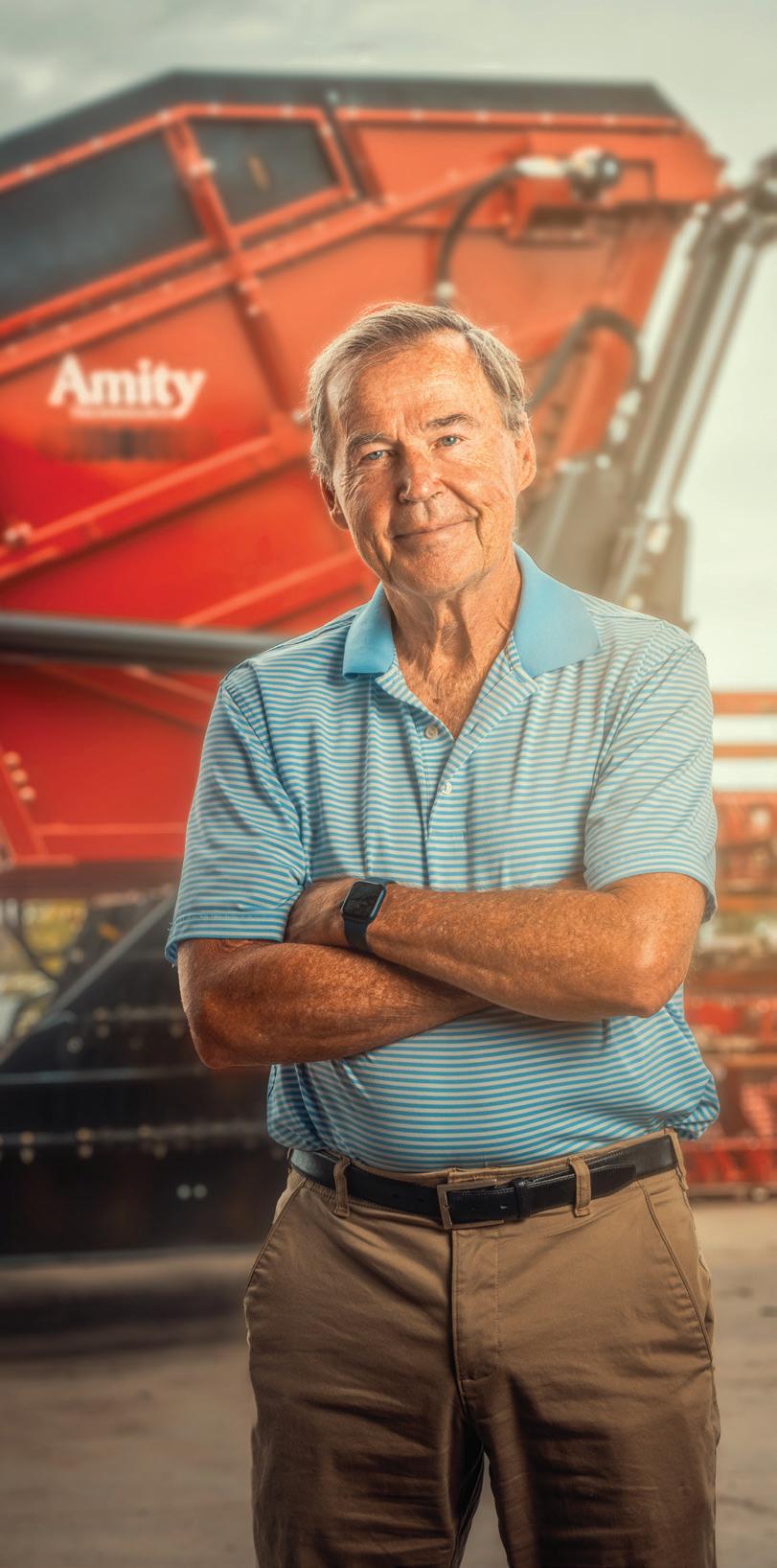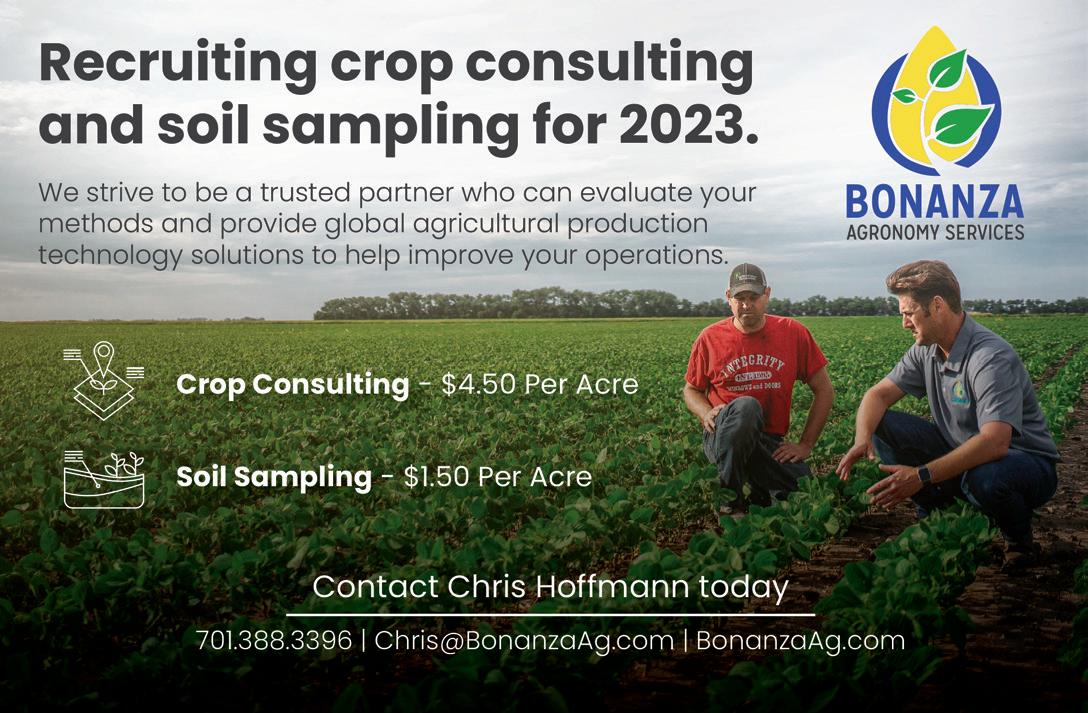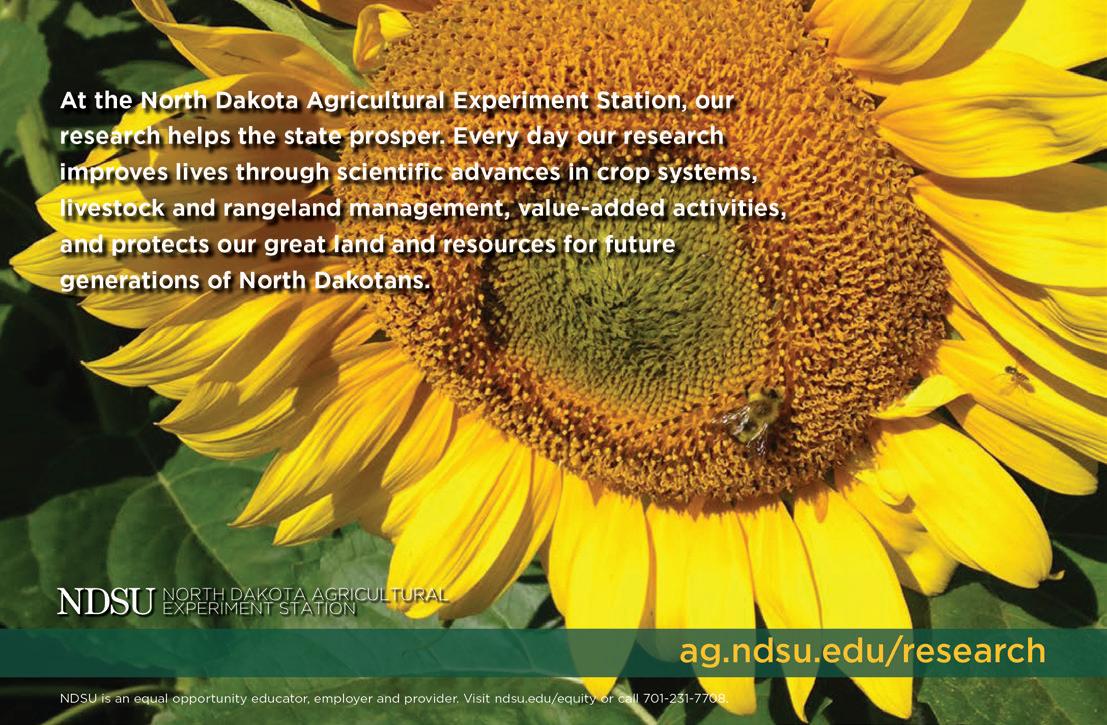
15 minute read
A CONVERSATION WITH HOWARD DAHL

By Brady Drake/Makenzi Johnson Photos by Josiah Kopp
ery few people are as worldly as Amity Technology
Founder/CEO/President Howard Dahl who has a vast knowledge of the global agriculture landscape from a lifetime spent learning and trying to make things new and better.
His career in manufacturing began in 1977 after receiving his master's degree in philosophy of religion from the Trinity Evangelical Divinity School. From there, he went on to start
Concord Inc. with his brother, Brian Dahl. The duo built the company to be an innovative leader in the air seeders business, allowing countless farmers to move to no-till or direct seeding of their crops. In 1996, the company was sold to Case, but the soil sampling equipment and sugar beet equipment were retained in a new company, Amity Technology. The company has continued to be a leader in innovation of agricultural machinery.


You grew up in a household where it was all innovation and pushing things forward with farming technology, What was it like growing up in that environment?
I don’t know any other environment. The greatest hint I can tell you is that my dad, two weeks before he died, as I was sitting with him said, “what are you doing that’s new?" That was his question. Two weeks before his death, "what are you doing that’s new?" He had this passion for creating better products and listening. When he was CEO at Steiger Tractor, Barry Batcheller was one of his engineers (before he went on to found Phoenix International and Appareo). Barry had the idea of using computers to control engines and transmissions on off road equipment—no one had done that before. Barry talked to my dad about it and dad said, “that’s exciting, go ahead and do it.” The Steiger Series 4 was superior to any other tractors being made at that time.
Was there any formal teaching that went on with any of that?
No, I just observed. I grew up in a town of 240 people, that was the size of Gwinner in 1960. Everything centered around the factory. My grandfather was called an inventor by necessity. He had a large farm and worked very hard, but felt the need to improve many machines. Even though he died before the Bobcat became part of the company, through a combination of innovative vision and hard work, he provided the foundation that allowed the Bobcat to be developed and succeed.
Was there ever a thought of not getting into the agricultural industry?
I actually spent six years away from North Dakota, working in student ministry and then going to graduate school. I missed the period when Steiger went from $2 million to $105 million of sales in a short time. I moved back here with the idea, at first,
of starting a company to do something for third-world agriculture. That was and remains a deep interest. We built a few prototypes of a simple tractor for the African market, but it was going to take so much capital to do it well. We pivoted and developed an air seeder that was just revolutionary. When I say “we,” I was not the inventor, I had a team of very creative people. I helped guide them and listened to them, but I’m not an engineer. It was a tough ten years getting off the ground and then it went like a rocket ship before we sold to Case IH in 1996.
What does guiding and leading a group look like?

It’s similar to being a coach. The coach will not be the best quarterback or lineman, but the coach needs to understand the roles of each player. In manufacturing, you need to have great engineers, great manufacturing people. You have to have strong financial management, for that is how you “keep score.” And of course you have to have sales which is like the blood of the company. Without sales, there’s nothing you can build. I think a good coach looks at all of them as equally important. I think the art of leadership is putting together a group of people that are confident and that you fully trust. Then, making sure they work together, not against each other. In some companies, there are rivalries between departments, even between people within the same department. Steven Covey wrote a wonderful book called The Speed of Trust. In companies where there’s a high-trust environment with teammates, you can get things done a lot better and a lot quicker. I think that really the most important thing you can do in leadership is to create that high trust environment.

How have you gone about fostering that type of environment?
I hired some really great people. When we started Concord, I wrote down objectives and one objective was to never have a blue collar/white collar dichotomy in the business. We do a quarterly board of directors meeting, but I also have a quarterly meeting for all of our employees where I give them an update on the DID YOU KNOW? Howard Dahl is the grandson of E.G. Melroe, the Founder of the Melroe company which developed the Bobcat loader.
company, what’s happened in the past months, and how we see things going forward and then they can ask any questions they want. I really try to treat it like a board of directors meeting in its own right. There are other things we’ve done imperfectly, but we work very hard to make sure everybody feels valued.
What are some things you wish you knew when you first got started?
I’m glad I was naive about some things. You’re not supposed to develop a product and take on John Deere and Case IH headto-head because your chance of winning there is not very good. I’m glad I wasn’t intimidated by that and just focused on developing a great product. On the same day in June of 1995, Case IH and John Deere came and tried to buy our company. We had much better sales, much better products than either of them had. Having said that, I wish I had a little better financial understanding of cash flow management. The 80s were very difficult and we put way too much equipment on what’s called floorplan financing, where we put the equipment at a dealer and paid interest on it. We spent way too much money on interest. We built to the wholesale market, not to the retail market, so I would say that would have been, looking back, my biggest regret.
Was there a specific life experience that sparked your interest and desire to help third world countries with agricultural development?
In my case, it was my Biblical understanding and the importance I've learned from it about taking care of the poor. We are to open our hands and our hearts to the poor and needy. In fact, we’re still hoping to be involved in doing some projects with a number of African countries and doing soil lab work and helping with agronomy management. I’ve got a son who’s focusing on that.
In the big picture, we had so many people who used the Concord air seeders that told us had they not bought our equipment, they wouldn’t have been able to continue farming. We helped lower their field costs in some cases by 80%. We increased their moisture in the soil and helped produce better yields. So, we had farmers throughout the world tell us that it was a game changer for them. That was highly satisfying.
It's no secret nobody is forced to buy anything that anybody builds. Our system is all voluntary and people vote with their checkbooks. If people don’t like what you’re building, they won’t buy it. If you don’t give them great service, then you’ll never have any repeat customers. If you’re looking long term, you have to make something that people really want and will add value to them. It's a tension getting value both ways. When we are pricing, we've got to be able to make some profit on it and it’s got to be a profitable decision for our customer. Every once and a while, we’ll build something that is a great product but it’s hard to sustain it and say, “this is going to be a good decision for us and our customers.” I think that’s a challenge everybody and every business has.
How often does it happen where a product is designed but never goes to market?
Quite often. We’ve had that experience a number of times.
Are you constantly trying to develop new products?
We are constantly talking about it. However, when we make a decision to actually build a prototype, it’s a lot easier today than it was 20 years ago because you can design the prototype on a computer and can do all the stress analysis right there on the computer. You can get very close to what the real machine will look like. It’s a wonderful tool that we have that we didn’t have 20 years ago, and for sure not 40 years ago.
Do you have thoughts on the things that the average grower really isn’t thinking but maybe should be thinking about?
All growers are wrestling with the whole carbon sequestration issue. I’ve spent a


Fargo
lot of time thinking about it and talking about it with people but I still don’t see a reliable way to measure or quantify it. A lot of people are claiming they have breakthroughs, we'll see.
In Europe right now, even the Netherlands, they're trying to limit the amount of nitrogen fertilizer they can use. The Netherlands, without increasing the amount of Nitrogen, has doubled their agriculture input in the last 20 years with very efficient usage of it.
In Sri Lanka, the prime minister put out an order to do organic farming throughout the country. He was just thrown out of office because they were having mass crop-fail years. There are a lot of ideologies on climate that don’t have their understanding of how food production really works. I think there are going to be a lot of efficiencies and we’re going to see fertilizer used much more efficiently in the future. We will also see all herbicides being spot sprayed—making sure we're identifying certain weeds and spraying with the right chemicals and not wasting the herbicides and fungicides and pesticides.
Clearly, we’re going to see autonomous tractors, even this fall. John Deere has released a number of them for production. There’s still the conventional tractor and the cab is still there so it can be used conventionally as well. I think 10 years from now we’ll see autonomous everything.
Is this an exciting time in agriculture for you, or do the uncertainties of today overshadow some of that?
Farmers are the ultimate entrepreneurs. Most risk a lot every year. Crop insurance has changed that risk a lot, but basically the average farmer gets 40 chances. Each year is a new chance. Farmers are very good at looking at return on investment, what crops they choose to plant and where they plant. They are increasingly concerned about inputs so a lot more split application of nitrogen. If you put all your nitrogen on in the fall, you’ll lose some of it and the crop won’t utilize it. We’re seeing a lot more careful stewardship of all the inputs and I think that will continue.
What are you planning to speak about at TedXFargo (this event took place July 21)?
I was asked to speak on Russia/Ukraine. I’ve never done an 8-10 minute speech so I wrote down my thoughts and it was probably a 30-minute talk. So I had to cut it down. I’m leaving out a lot of interesting things but my goal is to wet people’s appetite to study the historical text and cultural context a little bit more to better understand the whole Russian/Ukrainian situation. Really, when you understand that, you understand a lot of global conflicts taking place in other countries as well.
Putting on the miles! Dahl has made 93 trips over the course of his lifetime, to Russia. If he were to have flown directly from Fargo to Moscow each of those 93 times, he would have flown approximately 454,305 miles!
Moscow
How has the conflict affected your business?
It’s tragic. We have eight employees in Russia and basically everything is on pause, we’re just not sure what we’re going to do. We’re still paying their salaries, but it’s been an important part of our business and we just don’t know going forward. In Ukraine, we have one employee but I serve as chair of the board of the largest sugar company in Ukraine and it’s hard to relate to the severity of the crisis. We had a tractor driver killed by a Russian plane when a missile hit the tractor. It’s tragic.
You are extremely well traveled. How do you go about navigating the different cultural norms?
You can’t read enough about the background, history and culture in a country before doing business there. It’s just so important to do all that so you can understand why they are the way they are.
When you have information about another culture, whether it be a place like Russia or China, how much of what you do is to fit into their cultural norms, or are you just aware of them?
You’re never going to imitate their norms but you can understand them. I’ve probably read a hundred books on Russian culture and Russian history for 35 plus years, reading two or three a year. I’m at a point where I know Russian history better than many of the Russians that I go with.
China was a focus for a number of years for us but has not been a focus as of late. We sold some sugar beet equipment there and then they copied it and built a replica. It’s a very dangerous thing to take a machine into China where you don’t have intellectual property protection. We take for granted in the western world the rule of law which serves us very well but in most of the world bribes are a big part of doing business. We’ve learned very early on that in both Russia and Ukraine a lot of business is done through bribes.
What do you find most purposeful about your work today?
I’d say today, I find purpose in the overwhelming challenges of inflation and supply chain disruption. It’s been as challenging a year as I have ever had. Never before have we needed greater team spirit, team cooperation and the ability to overcome unbelievable obstacles.
Out in our assembly area, there are a number of hydraulic hoses that are being put on. Well, our usual supplier for those hoses is so far behind that we didn’t think we could get hydraulic hoses in time. So, we were fortunately able to find another supplier. However, there are other pieces we need that we aren't sure we'll be able to get before harvest. It’s a challenging time but to see people step up and respond and do extraordinary things is amazing. I use the word "purposeful" because it is purposeful to come in and help people who are working very hard and solving some big problems.
How have you managed to keep up with the changes over time in the innovation in the agriculture business? What do you read, and what do you consume?
A big part of my focus has been trying to better understand agronomy and the soil. It's physics, chemistry and biology all connected. One of the exciting things we have been involved in is FarmQA, a software company. We have a highly skilled team of ex-Microsoft developers who are creating a very robust platform for agronomists. We have a large number of agronomists using it, including many in North Dakota. They love it and it’s allowing them to better serve their customers. They basically create their own template for their agronomy. They are able to say, "these are the seven weeds I’m concerned about, these are the three diseases I’m concerned about, these are the pesticides that I need to think through." The role of the agronomist is to diagnose and then prescribe to the farmer what needs to be done. We use a recommendation tool and analytics tool to greatly enhance the ability of an agronomist to support his farmer customer.
Our interest in soils and in agronomy led us to start FarmQA, seven years ago. Now, we’re getting more and more traction and dealing with some very significant companies. When farmers are making a lot of money, they don’t manage their inputs as well as they could, if they were not making a lot of money. But there is no question that there is going to be increasing legislation to regulate all chemical and fertilizer inputs. This is the present reality in Europe, and today the buzz is around carbon sequestration. I think the tools we’re developing are going to be very helpful for all farmers.
Is there anything new and exciting our readers might want to know about?
The silage cart we built for Riverview Dairy called the Crop Chaser is a tribute to what happens when you listen well to a customer and then let talented engineers go to work. It was designed to empty 65,000 pounds of silage in 90 seconds. We have found since that it also works well for edible beans, sugar beets, corn, soybeans and wheat. For somebody that has a crop they can’t auger, like sugar beets or edible beans, we think it’s going to have a really interesting niche.
I also would like to just say that it’s a privilege to serve farmers and listen to what farmers need and then respond. I can’t think of a better place to be in business than working with farmers.
To learn more about Amity Technology, visit amitytech.com
Facebook: /amitytechnology
Twitter: @AmityTechnology





